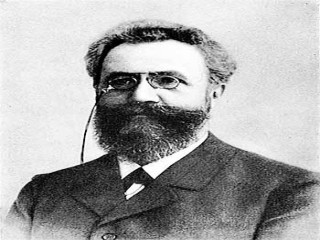
Hermann Ebbinghaus biography
Date of birth : 1850-01-24
Date of death : 1909-02-26
Birthplace : Barmen, Germany
Nationality : German
Category : Science and Technology
Last modified : 2011-06-14
Credited as : Psychologist, study of memory, Die Grundzuge der Psychologie
Hermann Ebbinghaus was born on Jan. 24, 1850, near Bonn. In 1867 he went to the University of Bonn and somewhat later attended the universities of Berlin and Halle. After the Franco-Prussian War he continued his philosophical studies at Bonn, completing a dissertation on Eduard von Hartmann's Philosophy of the Unconscious, and received his doctorate in 1873.
Ebbinghaus's goal was to establish psychology on a quantitative and experimental basis. While professor at Berlin, he founded a psychological laboratory, and in 1890 he founded the journal Zeitschrift fur Psychologie und Physiologie der Sinnesorgane. He became full professor in Breslau in 1894, where he also founded a laboratory. In 1905 he moved to Halle, where he died on Feb. 26, 1909.
In psychology Ebbinghaus found his own way. None of his instructors determined in any marked way the direction of his thinking. A major influence, however, was the combination of philosophical and scientific points of view he found in Gustav Theodor Fechner. He acknowledged his debt in the systematic treatise Die Grundzuge der Psychologie, which he dedicated to Fechner.
Ebbinghaus was an unusually good lecturer. His buoyancy and humor, together with the unusual clarity and ease of his presentation, assured him of large audiences. Another valuable trait was his Jamesian tolerance, which led him as editor to publish widely diverse opinions—a policy vital to a young science.
Ebbinghaus himself published relatively little. No records exist of the work he did before he published Memory (1885). In the introduction to this work, in the section on nonsense syllables, he says only, "I have hit upon the following method," and goes on to discuss the nature and mechanics of nonsense syllables. Memory, a fundamental central function, was thereby subjected to experimental investigation.
In 1894 William Dilthey claimed that the new psychology could never be more than descriptive and that attempts to make it explanatory and constructive were wrong in principle, leading to nothing but confusion of opinion and fact. Since this amounted to an attack on the very keystone of Ebbinghaus's faith, he undertook, despite his reluctance for controversy, to defend psychology as he understood it. In an article in the Zeitschrift fur Psychologie for 1896, he justified the use of hypothesis and causal explanation in psychology.
When Ebbinghaus died, the Grundzuge that he had begun early in the 1890s was only a little more than half completed; a colleague, Ernst Durr, finished it. The major virtues of these volumes lie in their readableness and convenient format rather than in any radical approach to psychology, but these qualities, together with their comprehensiveness and minor innovations, were sufficient to produce an enthusiastic reception. Ebbinghaus's Abriss der Psychologie (1908), an elementary textbook of psychology, also achieved considerable success.
Ebbinghaus's influence on psychology, great as it was, has been mostly indirect. Memory, undoubtedly his outstanding contribution, was the starting point for practically all of the studies that have followed in this field.
















